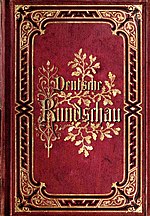Friedrich Kreyssig
Friedrich Alexander Theodor Kreyziger (born October 5, 1818 in God's gift , today: Zbożne , East Prussia ; † December 20, 1879 in Frankfurt am Main ) was a German pedagogue , school director and publicist .
Life
Kreyssig was the son of an East Prussian estate manager. Because the family's financial resources did not allow it, he should initially not receive a higher education . Instead he became an elementary school teacher in 1837. However, he gave up this position after a few months in order to prepare for the Abitur exam privately . Just a year later, he was able to take the high school diploma as an external applicant in Königsberg . He then studied philology and history from 1838 to 1842 in the East Prussian capital . During his studies he became a member of Hochhemia in 1838 .
School service
In the summer of 1843 he passed the examination for the higher teaching post and then got a job at the city school in Wehlau . From there, after two years, he was appointed the first senior teacher at the high school in Elbing , of which he was director from 1858. In 1869 Kreyssig was transferred to the new West German provinces of the Kingdom of Prussia. There, as director, he was responsible for the establishment and organization of a secondary school (1st order) in Kassel . Two years later, the Polytechnic Society in Frankfurt am Main put him in charge of the Wöhlerschule .
At a time when the higher schools in Germany were still strongly influenced by the humanistic ideal of education, Kreyssig campaigned emphatically for the new secondary school system: In addition to the old languages, newer philologies should also have their rights in the educational institutions. With this, Kreyssig paved the way for Romance and English studies into schools.
Journalism
Kreyssig was best known in Germany as a publicist and speaker. He was involved in the founding of the literary magazine Deutsche Rundschau from the start as a regular employee and advisor. He also wrote essays and reviews for the Prussian yearbooks and other periodicals of the time.
He was also known for his writings on the history of literature, in which he dealt primarily with aspects of French and German literary and intellectual history.
Kreyssig developed many of these writings into lectures, which he gave in large numbers in various German cities.
politics
Kreyziger had been a member of the National Liberal Party since 1866 . In the political writings Peace Thoughts and What It Matters Now , during the wars of unification, he urged the liberal parties to come to an understanding with the then Prussian Prime Minister Otto von Bismarck , in whose national intentions he believed as early as 1864 and for which he has emphatically advocated.
Works
- History of the French national literature from its beginnings to the present day . Samter, Koenigsberg 1851.
- Justus Möser . Nicolai, Berlin 1857.
- Lectures on Shakspeare, his time and his works . 3 volumes, Nicolai, 1858–1862.
- On the moral and popular justification of the Shakespeare cult . (Ceremonial speech) Elbing 1864.
- Studies in French culture and literary history . Nicolai, Berlin 1865.
- Lectures on Goethe's Faust . Nicolai, Berlin 1866.
- The poets of the Wars of Liberation , AH Payne, Leipzig 1870.
- About realism and secondary schools . Lüderitz, Berlin 1871.
- Lectures on contemporary German novels, literary and cultural-historical studies . Nicolai, Berlin 1871.
- Our Northeast Mark: memories and reflections on the occasion of the centenary celebration of the reunification of West Prussia with Germany . Danzig 1872 ( archive.org ).
- On the French intellectual movement in the nineteenth century, three lectures . Nicolai, Berlin 1873 ( archive.org ).
- Literary studies and characteristics . Berlin 1882 (posthumous work with an introduction by Julius Rodenberg ; archive.org ).
literature
- Konrad Friedländer: Kreyssig, Friedrich Alexander Theodor . In: Allgemeine Deutsche Biographie (ADB). Volume 17, Duncker & Humblot, Leipzig 1883, p. 155 f.
- Anonymous: Friedrich Kreyssig. An obituary . In: Deutsche Rundschau , Volume 22 (1880), pp. 314-317.
- Fritz Wernick: Friedrich Kreyssig. A picture of life . In: The Gazebo . Volume 5, 1880, pp. 76–79 ( full text [ Wikisource ]).
- Helge Dvorak: Biographical Lexicon of the German Burschenschaft. Volume I: Politicians. Volume 3: I-L. Winter, Heidelberg 1999, ISBN 3-8253-0865-0 , p. 176.
Web links
Individual evidence
- ^ Konrad Friedländer: Kreyssig, Friedrich Alexander Theodor . In: Allgemeine Deutsche Biographie (ADB). Volume 17, Duncker & Humblot, Leipzig 1883, p. 155 f.
- ^ Kreyssig, Friedrich Alexander Theodor - Romanistenlexikon. Retrieved September 24, 2017 .
- ↑ Wissen-digital.de
- ↑ Friedrich Kreissig. An obituary . In: Deutsche Rundschau , Volume 22 (1880), pp. 314-317.
- ^ Friedrich Kreyssig - Wikisource
| personal data | |
|---|---|
| SURNAME | Kreyssig, Friedrich |
| ALTERNATIVE NAMES | Kreyssig, Friedrich Alexander Theodor (full name) |
| BRIEF DESCRIPTION | German pedagogue, school director and publicist |
| DATE OF BIRTH | October 5, 1818 |
| PLACE OF BIRTH | God's gift , today: Zbożne , East Prussia |
| DATE OF DEATH | December 20, 1879 |
| Place of death | Frankfurt am Main |

